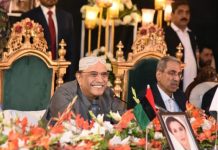ISLAMABAD: With Pakistan’s 10th general elections set to take place tomorrow (February 8), a report by the International Crisis Group (ICG) predicts the country is inching towards contested polls, The News reported on Wednesday.
The report mentioned that there are chances of damaging the incoming government’s legitimacy no matter which party assumes power, as opportunities to address the flaws in the process are fast shrinking. Therefore, the election day could be marred by disputed polls.
The ICG, in its report, advised all political parties to uphold their opponents’ right to contest the polls and form a government if elected, instead of turning a blind eye to interference by the caretaker governments and law-enforcement agencies.
The report points out that amid the deep polarisation in the country, the superior judiciary has removed some of the hurdles that lie in the way of a reasonably competitive election, but, on the other hand, the Supreme Court’s support for the election commission’s decision to deny the PTI a common election symbol has sparked fierce controversy.
“Pakistan is holding general elections in a climate of deep political polarisation and a military crackdown on former prime minister Imran Khan’s PTI party.
“The election commission must ensure that all parties, including the PTI, contest the polls and all voters, particularly women, are able to cast their ballots. A disputed poll would damage the incoming government’s legitimacy, leaving it ill-equipped to deal with the political and economic instability that is sure to follow,” says ICG Asia Director Huong Le Thu.
Pointing to what it says is the country’s economic survival which states that a standby agreement with the IMF, which ends in March, was a short-term fix, aimed at ensuring that the economy did not collapse before a new government is chosen.
“A new, longer-term deal with the IMF will be crucial to ensure the continued flow of external assistance to cash-starved Pakistan. But such an agreement will not be enough to keep the economy afloat in the absence of political stability, something that will be elusive without a peaceful, credible transfer of power,” it advocates.
The well-researched report says that the election commission, the body primarily responsible for overseeing the polls, is going into the 2024 contest with damaged credibility.
“To regain public trust, it should seek to ensure that the central and provincial interim administrations respect the right of all political parties to prepare for and participate in the vote. It might be an uphill battle to eliminate disadvantages for the PTI and other parties, given the heightened polarisation, but a blatantly uneven contest will hurt the next government,” says the ICG.
Parties should also do their best to ensure that the polls are not tilted against any one contender. Politicians across the divide should recognise the importance of a fair contest as a means of reviving Pakistan’s weakened democracy. The election commission, adds the ICG, has failed to curb interference by the caretaker governments that, in accordance with the law, hold power around Pakistani elections. Nor has it exercised sufficient oversight over its own personnel.
“A flawed poll will harm the incoming government’s legitimacy, fuel discontent and heighten risks of tumult in a country already reeling from attacks by jihadist insurgents. The election commission must try to ensure that all parties contest the polls freely.
“The superior judiciary should uphold fundamental freedoms of association and expression, while Pakistan’s politicians should reject attempts at electoral manipulation by the civil or military bureaucracies,” points out the report.
Though the PTI’s support appeared solid after Khan’s removal, the ICG says his subsequent bid to take on the military has upended the party’s prospects. His relationship with the military tanked following his May 9, 2023 arrest on corruption charges, which triggered a nationwide rampage by PTI supporters.
The commission’s own ill-advised actions are also eroding its legitimacy. Whichever party wins, flawed elections would tarnish the incoming government, leaving it ill-equipped to deal with the instability that would seem sure to follow. High levels of polarisation and a potential one-sided poll mean the actions of the courts, the election commission and political parties will shape risks of conflict.

















